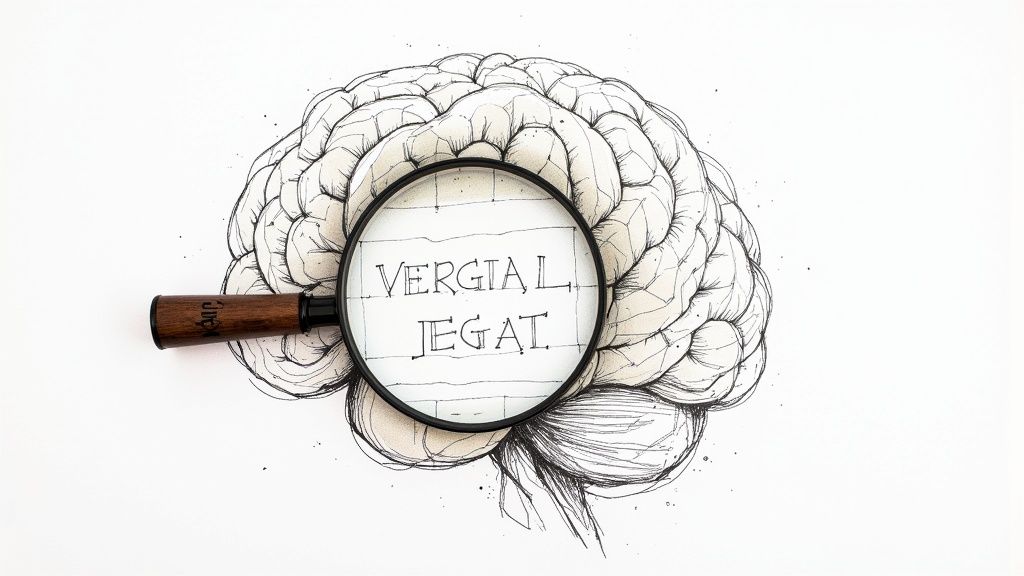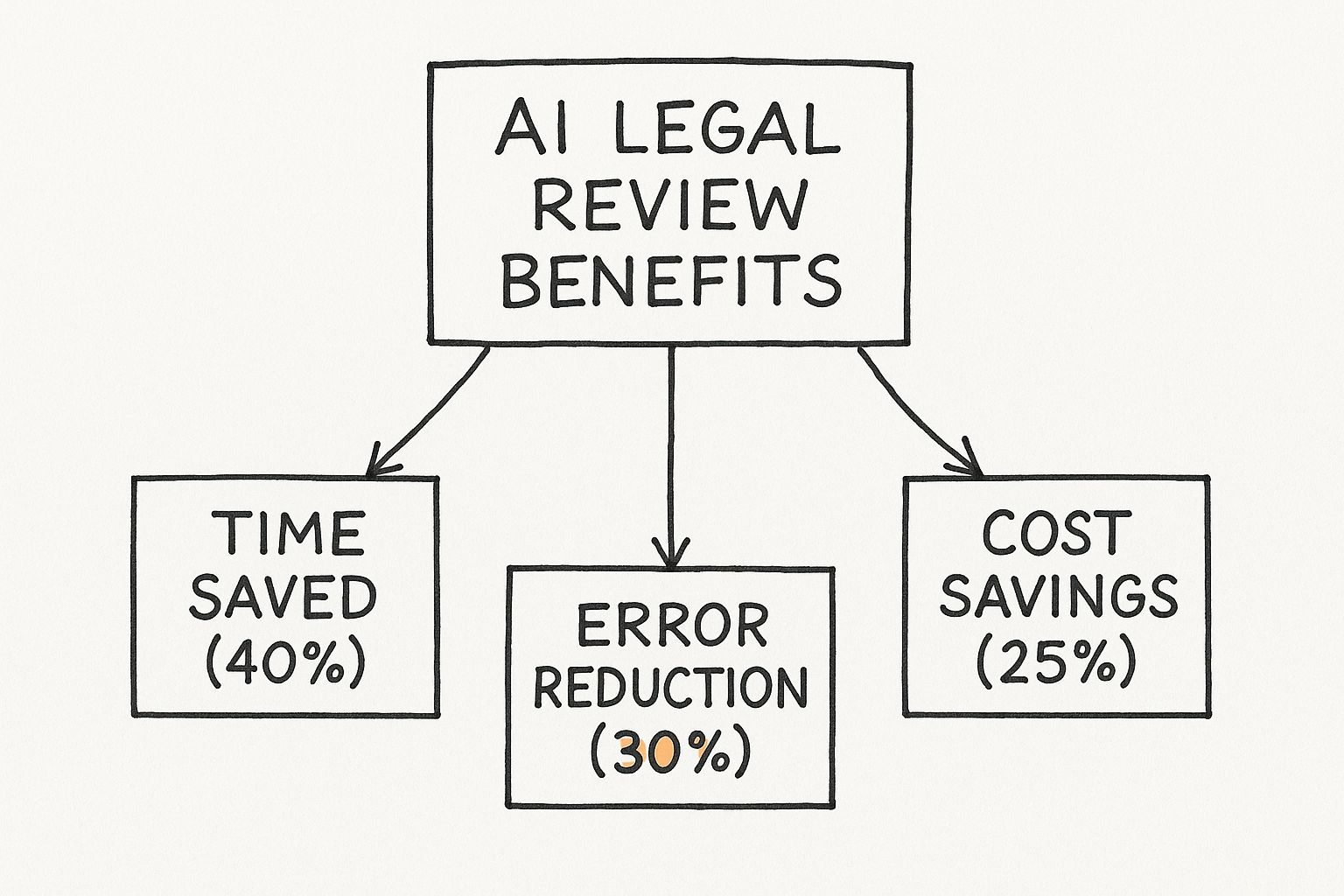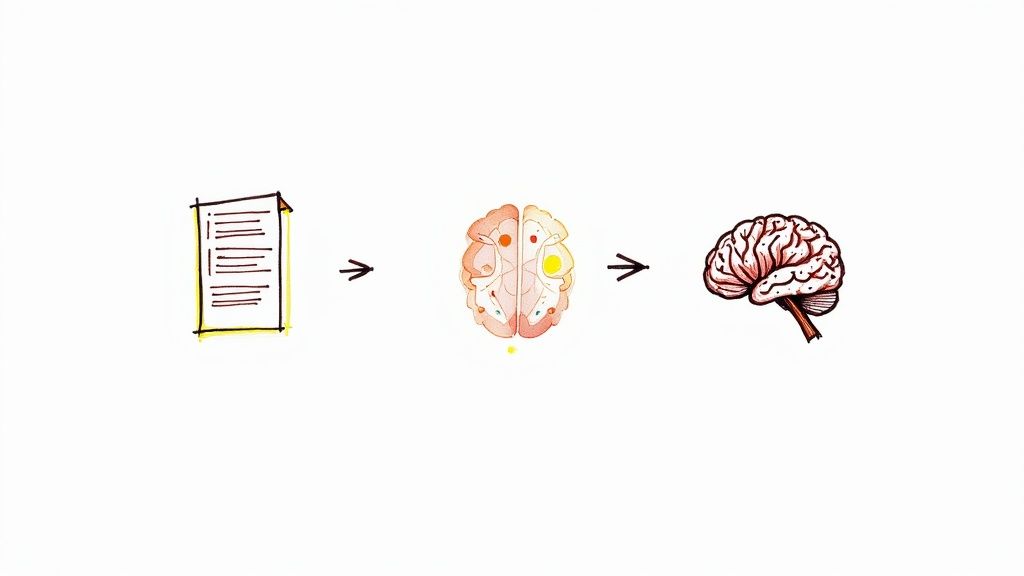Ever get that sinking feeling when a new rental agreement or app's terms of service lands in front of you? It's a wall of text, and you're lost in a sea of jargon. You're definitely not alone.
AI legal document review is like having a super-smart assistant on your side. This technology instantly reads through those dense documents for you, highlighting confusing clauses, flagging hidden fees, and pointing out potential risks—all in plain English.
Tired of Fine Print You Can't Understand?

We’ve all been there. A long document filled with confusing paragraphs stands between you and something you need—a new apartment, a freelance contract, or even just installing new software. It's frustrating.
You’re faced with a choice. Do you spend hours trying to figure out every single line, or do you just give up, scroll to the bottom, and click "I agree," hoping for the best? It’s a common gamble that often leaves people exposed to unfair terms they never even knew they accepted.
A Smarter Way to Review Documents
This is exactly where AI legal document review changes things for everyday people. Forget thinking of it as some complicated legal software. It’s more like having a knowledgeable friend who can instantly scan the fine print for you.
Instead of needing a law degree to understand a contract, the AI does the hard work. It's been trained on thousands of legal documents, so it knows how to spot the kind of tricky language that often signals trouble. This gives you the power to understand exactly what you’re signing, putting you back in control.
Think of it this way: using an AI to get a first look at a contract helps you instantly zero in on the parts that actually need your full attention. It’s a powerful way to focus your efforts where they matter most.
Now, the goal isn't to replace a real lawyer. Instead, it’s about giving you a handy first line of defense. An AI review helps you flag potential issues right away, so you can ask the right questions or negotiate better terms before you’re locked in. A simple check like this can save you from major headaches, from unexpected fees on a lease to accidentally giving away more of your personal data than you realize.
To see the difference, let's compare the old way of doing things with the new, AI-powered approach.
Manual vs. AI Document Review: A Quick Comparison
The table below shows the key differences between you trying to review a legal document on your own and using an AI tool like TermsEx to help.
| Aspect | Manual Review (You) | AI-Powered Review |
|---|---|---|
| Speed | Slow and time-consuming; can take hours. | Nearly instant; analyzes documents in seconds. |
| Accuracy | Easy to make mistakes or miss key details. | Highly accurate at spotting specific clauses and risks. |
| Understanding | Often confusing; legal jargon is a major barrier. | Translates complex terms into simple, plain English. |
| Confidence | Low; often leads to uncertainty and "click-and-hope." | High; gives you clear insights to make informed decisions. |
| Cost | Free (but costs you time and potential risk). | Typically low-cost or free for basic analysis. |
As you can see, the AI-powered approach doesn't just save time—it gives you a level of clarity and confidence that's almost impossible to get on your own without a legal background. It's about leveling the playing field.
How AI Reads and Understands Legal Documents
It might seem like magic when an AI plows through a dense contract in seconds, but the process is surprisingly logical. At its core, an AI legal document review tool is trained on a huge library of existing legal documents—everything from simple rental agreements to complex software terms.
By studying thousands of these examples, it learns to recognize patterns, much like a seasoned lawyer does after years of practice. This "experience" allows the AI to understand what's normal and what's not. It identifies standard clauses and common phrasing, which is exactly what makes it so good at flagging language that might otherwise fly under the radar.
From Keywords to Context
A simple keyword search is pretty limited. You could search a document for "termination," but what if the contract talks about "ending the agreement" or "dissolving the partnership" instead? You'd miss it completely. This is where the AI's real intelligence shines.
The technology behind this is called Natural Language Processing (NLP). Think of NLP as the AI's ability to read and understand human language, including all its nuances and tricky legal phrases. Instead of just matching keywords, it grasps the context and meaning behind the words.
An AI using NLP can spot a termination clause even if the words "termination clause" are never used. It understands the concept, not just the label—a critical difference for any real analysis.
This leap in technology is what makes AI so powerful for document review. AI systems trained in NLP don't just find words; they understand context, detect patterns, and sort information. For example, an AI can sift through thousands of agreements to highlight red flags that might go unnoticed by the human eye. To learn more about how AI is reshaping the legal field, you can find great insights on callidusai.com.
The infographic below shows some of the core benefits that come from this advanced understanding.

As you can see, the main advantages are major gains in speed, accuracy, and overall cost savings.
A Trustworthy Process
When you understand how an AI gets from raw text to useful insights, the "magic" starts to look a lot more like a trustworthy process. The system isn’t just guessing; it's methodically applying what it's learned to new information.
Here’s a quick look at the steps involved:
- Reading the Document: First, the AI reads the document, whether it's a PDF you upload or text you paste in.
- Identifying Clauses: It then breaks the entire document down into individual clauses and sentences.
- Spotting Patterns: Each piece is compared against the huge database of legal concepts it was trained on.
- Highlighting Risks: Finally, it flags clauses that seem unusual or match known risk patterns, presenting its findings in simple, easy-to-understand terms.
This structured approach turns a scary task into a manageable one, giving you a clear and reliable overview in a fraction of the time.
Everyday Situations Where AI Can Protect You

The real magic of an AI legal document review tool isn't just its technology—it's how it acts as a practical shield in your daily life. Confusing legal concepts quickly become real-world protections when you're faced with common situations where the fine print truly matters.
Let's look at a few relatable scenarios. These examples show how a tool like TermsEx can spot risks you might easily miss, turning a confusing document into a source of confidence.
Signing a New Apartment Lease
You’ve finally found the perfect apartment. Before you sign, you run the lease through an AI review. In seconds, it flags a clause buried deep on page seven.
The clause says you must give a 90-day notice before moving out, which is way longer than the standard 30 or 60 days in your area. The AI also highlights an unusual pet policy that lets the landlord demand your pet's removal with just 24 hours' notice for any reason they see fit.
Without this quick check, you could have signed a lease packed with tricky terms that create major headaches later. Now, you can go back and negotiate these points with the landlord before you sign.
Starting a Freelance Gig
Imagine you're a freelance graphic designer, excited to start a new project. The client sends over their contract, and at first glance, everything seems fine. You use an AI tool just to give it a quick look.
The AI immediately flags two big issues:
- Vague Payment Terms: The contract simply says you'll be paid "upon project completion." It doesn't specify a timeframe, like "within 15 days." This could leave you waiting months for your money.
- Ownership Rights: The wording gives the client ownership of all draft concepts, not just the final approved design. This means they could use your rejected ideas for other projects without paying you for them.
These are exactly the kinds of details that are easy to miss when you're focused on the creative work. The AI review gives you the information you need to ask for clearer, fairer terms that protect both your income and your work.
An AI document check acts as your personal risk detector. It’s trained to spot what’s out of the ordinary, giving you an immediate heads-up on terms that could hurt you down the line.
Accepting App Terms of Service
You download a new photo-editing app and are about to tap "I Agree" on the terms of service. But this time, you pause and paste the text into an AI analyzer.
The summary reveals something startling: by agreeing, you're giving the app a "perpetual, worldwide, royalty-free license" to use, modify, and distribute any photos you edit with their service. In plain English, they could potentially use your personal photos in their own marketing without ever asking you or paying you. If you're curious what full-length terms look like, you can see an example by reviewing the TermsEx terms of service.
This is a huge privacy risk that millions of people accept without a second thought. Armed with this knowledge, you can make a real decision about whether the app's features are worth giving up control over your personal photos. In each case, an AI legal review transforms you from a passive signer into an informed consumer.
The Real Benefits of AI Contract Review
So, what's the real upside to using AI for your contracts? It's about more than just saving a few minutes. When you start using AI legal document review, you completely change how you deal with the agreements that shape your life, putting you on much safer ground.
The most obvious win is speed. A task that could easily take you hours—like reading a dense rental agreement or a complicated freelance contract—gets done by an AI in minutes. It cuts right through the fluff and gets to the important stuff.
But that speed doesn't mean you're sacrificing accuracy. In fact, it's the opposite. An AI never gets tired and is designed to scan every single word, flagging weird phrasing or risky clauses you might have missed. A tired human eye can easily skim past a critical detail buried deep in the fine print.
Save Money, Gain Confidence
Let's talk about the most practical benefit: saving money. While an AI is not a lawyer, it gives you an incredibly affordable first look at a document. It helps you spot potential red flags early, so you can decide if you even need to pay for professional legal advice.
This same idea creates massive time savings in the business world. A Thomson Reuters report found that AI tools could free up roughly 240 hours per year for legal professionals just by taking over routine work like document analysis. It's a clear example of how AI makes work better by being consistently accurate and cutting down on human error. You can learn more about how AI is reshaping the legal profession on legal.thomsonreuters.com.
The biggest benefit of all is empowerment. When you actually understand the documents you're signing, you have the confidence to ask smart questions, negotiate for better terms, and protect yourself from expensive surprises later on.
Ultimately, using an AI for contract review isn't just about convenience. It’s about taking back control and making smarter decisions. By turning confusing legal language into clear, useful insights, this technology gives you the clarity to handle important agreements without feeling intimidated or overwhelmed. You're no longer just signing and hoping for the best—you're signing with your eyes wide open.
How to Choose the Right AI Legal Tool
Ready to try an AI legal document review tool? There are a lot of options out there, but they're not all the same. Picking the right one means the difference between getting clear, reliable insights and ending up even more confused.
Think of it like choosing a new app for your phone. You want something that’s easy to use, does what it promises, and—most importantly—respects your privacy.
First, let's talk basics: how easy is it to use? A great tool shouldn't require a thick instruction manual. You should be able to upload a document or paste in some text and get going right away. If the platform feels clunky or confusing, it's just going to add to your stress.
Next, look at the results. Does the tool just throw more legal jargon back at you, or does it translate those dense clauses into plain, simple English? The whole point is to understand what you're signing. A service that gives you easy-to-read summaries and clear warnings about potential risks is far more valuable.
What to Look for Before You Upload
Beyond how it looks and feels, you need to do a little homework to make sure the tool is trustworthy. Before you commit to any service, run through this quick checklist.
- File Support: Can the tool actually handle the files you use? Check if it supports common formats like PDFs and Word documents. The ability to analyze text from a website link is also a huge plus, especially for reviewing online terms of service.
- Privacy and Security: This one is a big deal. Take a minute to read the company’s privacy policy and understand how your data is handled. You want to see clear statements on data encryption and whether your documents are stored long-term or deleted right after analysis.
- Pricing: Is the cost clear? Many tools offer a free trial or a few free reviews to get you started. Make sure you understand the pricing so there are no surprises later on.
A trustworthy AI tool will always be upfront about its security measures and how it protects your sensitive information. Never upload personal documents without first confirming the platform’s commitment to your privacy.
Finally, see what other people are saying. Customer reviews often give you the most honest look into a tool's real-world performance.
By checking these key areas, you can confidently pick a service that actually helps. Exploring options like the AI-powered tools from TermsEx is a great way to start finding a solution that offers both clarity and security.
Knowing the Limits of AI Document Review

While an AI legal document review tool is an incredibly powerful ally, it’s just as important to understand what it can't do. Think of it as a super-powered calculator for legal language—it’s lightning-fast and accurate at spotting patterns, but it can’t give you personalized legal advice.
Its real job is to flag potential risks and translate confusing jargon, not to act like a qualified lawyer. It’s your first line of defense.
For everyday documents, an AI review gives you a clear heads-up on potential issues. But for something complex and high-stakes, like a major business deal or a real estate purchase, you should treat its analysis as the perfect starting point for a conversation with a legal professional.
AI Is a Guide, Not a Lawyer
It’s easy to forget that AI systems, for all their power, can still get things wrong. They might stumble over a highly unusual clause or miss the specific local context that a human lawyer would instantly recognize. The results you get are a powerful guide, but they're meant to help your own review, not replace it.
A common fear is that these tools are too complicated for the average person, but the opposite is usually true. Platforms like TermsEx are built to be simple, designed to make complex information accessible to everyone, not just legal experts. You don’t need a technical background to get clear, useful insights from your documents.
A core principle of any trustworthy AI is transparency. This means being upfront about what the technology can and cannot do, so you can use it wisely and with confidence.
Even within the legal industry, lawyers are taking a thoughtful approach. A recent report found that while overall AI adoption among legal professionals stood at 69%, corporate legal teams were far quicker to embrace it than traditional law firms. To get a better sense of how legal experts are using AI, you can explore the full report's findings on abovethelaw.com.
This shows that AI is seen as a strategic tool for handling document challenges, not as a replacement for human expertise. This transparency also extends to how your data is handled, and you can always review the TermsEx privacy policy to understand exactly how your information is protected.
Answering Your Questions About AI Document Review
It's smart to ask questions before trying any new technology. When it comes to something as important as your documents, you want to be sure. Let’s clear up a few of the most common questions people have about AI legal document review so you can use these tools with confidence.
Is It Safe to Upload My Documents?
Yes, as long as you choose a reputable tool. High-quality AI platforms treat your privacy as seriously as your bank does. They use strong encryption to protect your documents from the moment you upload them to when they're being analyzed.
The best services also have clear, strict privacy policies spelling out that your information will never be sold or shared. Before uploading anything sensitive, always take a minute to check the tool's security features. Services like TermsEx are transparent about how they handle your data and make it a point to delete it after the review is complete.
Just How Accurate Is the AI?
It's incredibly accurate at spotting standard clauses, potential risks, and weirdly-worded phrases. This precision comes from being trained on millions of legal documents, which lets it recognize patterns far more consistently than a person ever could. In fact, a recent Clio survey found that 79% of lawyers are now using AI in some form, trusting its ability to get the details right.
But it’s not perfect. An AI might miss the unique, custom-written nuance in a highly specialized contract. That’s why it’s best used as a powerful first check. It flags the key areas that need your attention, letting you focus your energy where it matters most.
Think of AI as an incredibly sharp-eyed assistant. It circles everything you need to look at, but you’re the one who makes the final call.
When Should I Still Call a Lawyer?
You should always consult a qualified lawyer for high-stakes situations. This means major business deals, real estate transactions, drafting a will, or any legal dispute where the outcome could seriously impact your finances or your life.
AI is a fantastic tool for making sense of everyday agreements—things like apartment leases, freelance contracts, or the terms of service you click "agree" on. It arms you with information, but it doesn't give legal advice and can never replace the tailored judgment of a professional attorney.
Ready to review documents with confidence? TermsEx uses AI to translate confusing legal jargon into simple, actionable insights, so you always know what you're signing. Try it for free and take control of your agreements today.
Article created using Outrank